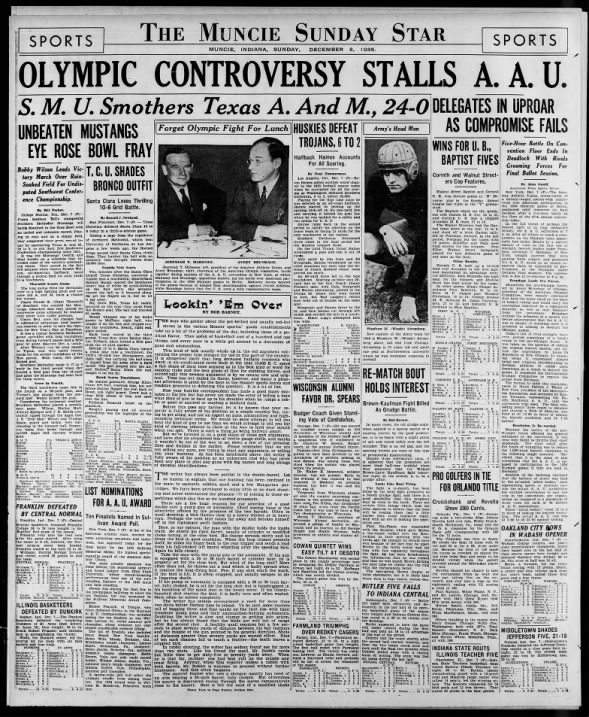- Headline
-
Olympic Controversy Stalls A.A.U.
- Sub-Headline
- Delegates In Uproar As Compromise Fails
- Publication Date
- Sunday, December 8, 1935
- Historical Event
-
Amateur Athletic Union Says “Yes” to Berlin Olympics
This database includes 2,208 articles about this event - Article Type
- Newspaper
- Page Section and Number
- 10
- Author/Byline
- Alan Gould (AP)
- Article Text
- New York, Dec. 7 (AP)—The Amateur Athletic Union, storm-center of a bitterly-waged nation-wide controversy over American participation in the 1936 Olympic games at Berlin, postponed until tomorrow its final decision after a five-hour annual battle on the floor of the 47th annual convention today.
In the full throes of perhaps the hottest fight of its long, embattled history, the A. A. U. adjourned at 7 p. m. After all efforts to reach a compromise on the Olympic issue apparently had failed. Beaten by a narrow margin of votes on the first test of strength, boycott leaders under President Jeremiah T. Mahoney, of York, tonight asserted they were gaining fresh support and predicted the A. A. U. would go on record tomorrow flatly in opposition to participation in the Olympics under German Nazi auspices. The convention is due to re-convene at 9 a. m.
Brundage Leads Pro Forces.
Meanwhile the pro-Olympic forces, led by Avery Brundage of Chicago, president of the American Olympic Committee, were equally convinced they held the upper hand on the basis of today's voting and would carry the convention tomorrow by a substantial majority, as well as oust Mahoney from the presidency. Brundage warned the delegates in a speech just before adjournment that the A. A. U. was in danger of wrecking itself if it persisted in seeking to obstruct the Olympic games.
Today's test of rival strength, however, proved something of a boomerang to the pro-Olympic forces. It was taken on the question of tabling the original boycott motion, put before the convention by Louis Di Benedetto of New Orleans. In sweeping terms it condemned alleged racial and religious discrimination in German athletes. It called upon Americans as a whole to boycott the games. It requested the International Olympic Committee to remove the games from Germany.
The motion to table this resolution, made by Major Patrick J. Walsh of New York, president of the Metropolitan Association, and seconded by Roscoe Torrance, representing the Pacific Northwest A. A. U., split the convention wide open. The final vote, taking nearly three hours to tabulate and causing a flock of disputes, was fixed at 61 53/60 in favor of tabling the boycott resolution and 55 7/60 against.
Resolution Is Re-worded.
Whether the tactics of the pro-Olympic forces affected the general sentiment of the convention, it was clear they failed to throttle their chief opponents. The chief result after five hours of wrangling was to reduce the 1,000-word boycott resolution to the following single sentence: "Resolved, that it is the sense of this convention that the A. A. U. is opposed to participating in the 1936 Olympic games if they are held in Germany."
Analysis of the balloting disclosed that the balance of power was held by the so-calied "allied bodies," each representing sports or interests outside the actual A. A. U. jurisdiction but entitled nevertheless to cast one vote in the convention, per organization, as compared to a maximum of three votes for each of 34 district A. A. U. associations.
These "allied bodies," voted 13 to 2 in favor of tabling the boycott resolution. The actual A. A. U. vote was 53 7/60 to 48 53/60 against tabling. - History Unfolded Contributor
- Ashley O.
- Location of Research
- Newspapers.com (https://www.newspapers.com)
Learn More about this Historical Event: Amateur Athletic Union Says “Yes” to Berlin Olympics
- Nazi Olympics Berlin 1936 (Online Exhibition)
- The Nazi Olympics Berlin 1936 (Encyclopedia Article)
- The Movement to Boycott the Berlin Olympics of 1936 (Encyclopedia Article)
- The Nazi Olympics: African American Voices and “Jim Crow” America (Encyclopedia Article)
- 1936: Key Dates (Encyclopedia Article)
Bibliography
Bachrach, Susan D. The Nazi Olympics: Berlin 1936. Boston: Little, Brown, 2000.
Committee on Fair Play in Sports. Preserve the Olympic Ideal: A Statement of the Case Against American Participation in the Olympic Games at Berlin. New York: The Committee, 1935.
Large, David Clay. Nazi Games: The Olympics of 1936. New York: W.W. Norton, 2007.
Lipstadt, Deborah E. “The Olympic Games: Germany Triumphant.” In Beyond Belief: The American Press and the Coming of the Holocaust, 1933-1945, pp. 63-85. New York: Free Press, 1986.
Mandell, Richard D. The Nazi Olympics. Urbana: University of Illinois Press, 1987.
Rubien, Frederick W., ed. Report of the American Olympic Committee: Games of the XIth Olympiad, Berlin, Germany, August 1-16, 1936: IVth Olympic Winter Games, Garmisch-Partenkirchen, Germany, February 6-16, 1936. New York: American Olympic Committee, 1936.
All articles about this event
